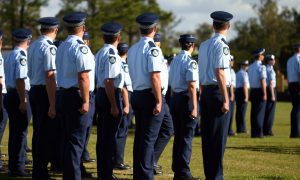Trooper Selection Process Description
The Pre-Employment testing portion of the Trooper Selection Process is comprised of several phases, which include written examinations, a physical fitness for duty assessment, polygraph examination, background investigation, oral interview board, medical examination, drug screening, and a psychological examination and interview. You are expected to successfully complete each phase of the selection process to be considered for employment.
After each testing phase, you will receive written notification of your status. Due to this, it is imperative the Human Resources Division has a current mailing address and telephone number on file for you. You are responsible for immediately notifying Human Resources of any address or telephone number change. All individuals are notified of their status and informed of the application procedures for future testing periods.
A detailed explanation of each phase of the selection process is listed below:
1. Written Examination
- ALERT Examination (Reading Comprehension and Writing Skills) – This examination is designed to measure an applicant’s reading comprehension and writing skills. This test measures important basic abilities that are required for performing the job of a law enforcement officer. The first part of the test contains sixty (60) questions that deal with reading comprehension. It contains several passages of reading material concerning police subject matter; following each passage are a number of multiple-choice questions. Answers are chosen based upon what is said in the passage, not on information from other sources. The second part of the test contains one hundred (100) multiple-choice questions that deal with writing skills. The areas examined are clarity, detail, spelling, and grammar. Each part of the test has its own separate instructions. The time limit for the ALERT test is two hours.
- PAF Examination (Police Attitudinal Factors) – This examination is an employment device designed to evaluate law enforcement applicants. This test measures attitudes, which are highly relevant to one’s effectiveness in dealing with the public as an officer. For each question, there are two statements. You must choose the one statement in each pair with which you most agree. There are a total of 125 questions. The time limit for the PAF test is one hour.
- FCS Examination (Field Contact Scale) – This examination is designed to determine how you feel about issues relating to police work. Each question consists of a brief statement. You must indicate whether you agree or disagree with each statement. There are a total of 40 questions. The time limit for the FCS test is twenty minutes.
NOTE: Preparation for the ALERT examination should include reading comprehension, writing skills, basic spelling, grammar, and punctuation. Since the PAF and FCS examinations relate to the applicant’s attitude, no preparation is necessary.
2. Fitness For Duty Assessment
The fitness for duty assessment was developed following an in-depth task analysis and validation study of the daily responsibilities an entry-level trooper performs. The assessment is comprised of eight events. A test monitor demonstrates each event while another test monitor simultaneously reads the event instructions. Applicants are encouraged and allowed time to ask questions necessary to thoroughly understand each event prior to their participation. This phase of the selection procedure is normally conducted at the Law Enforcement Academy in Jefferson City. Listed below is the name and description of each event:
NOTE: Preparation for the Fitness For Duty Assessment should include cardiovascular endurance, upper body strength, and overall body conditioning.
- Half-mile Shuttle Run – Applicants are required to demonstrate their cardiovascular endurance. The applicant begins behind a start line in a standing position. After a “Get set, Go” signal, a stopwatch is activated. The applicant runs 15 round trips around two traffic cones set 88 feet apart for a distance of one-half mile. When the applicant crosses the finish line, the time is stopped and recorded as the applicant’s score.
- Side Step – Applicants are required to demonstrate their physical agility, coordination, and running ability by performing side steps for a 60 second period. Side steps are performed on a hard surface that is marked with three parallel lines spaced 48 inches apart (e.g., covering a total distance of 96 inches). The applicant starts in a slightly crouched position with their feet centered on the middle line about two feet apart. The applicant slides back and forth across the centerline touching each of the two outside lines with the foot nearest the line. One point is scored each time the centerline is crossed with both feet and an outside line is touched. Side stepping must be done with the body facing forward and without crossing the feet during the side-to-side motions.
- Grip Strength – Applicants are required to demonstrate their grip strength using a Handgrip Dynamometer. The applicant exerts their maximum grip strength using their right and left hand. The results are measured in pounds. The right and left hand scores are recorded separately then added to formulate a composite score for the event.
- Standing Long Jump – Applicants are required to demonstrate their leg power by performing a standing long jump. After a “Get set, Go” signal, the applicant, who is standing at the take-off line, must jump as far forward as possible. The measurement is made from the take-off line to the heels, or any part of the body, which touches the floor nearest the take-off line. The measurement, to the nearest half-inch, is recorded as the applicant’s score.
- Shoulder Strength – Applicants are required to demonstrate their shoulder strength using the Shoulder Strength Adduction Device. The applicant exerts their maximum pressure in pushing the two handles together and holding that position for two seconds. The maximum score is recorded.
- Trigger Pull (Pistol firing simulation) – Applicants are required to demonstrate their ability to pull the slide of a Patrol pistol back and pull the trigger six times with their right and left hand. They will also required to load and unload the magazine of the pistol with their right and left hand, then lock the slide to the rear with either hand. Applicants are allowed a maximum of two and a half minutes to complete this pass or fail event.
- Dynamic Arm Strength – Applicants are required to demonstrate their dynamic arm strength using an ergo meter, fitted with handgrips. The applicant is seated on the floor behind the apparatus. The resistance on the ergo meter is set to 2.5 KP. The applicant is required to crank the handles as quickly as possible for 30 seconds. A counter records revolutions.
- Push-ups – Applicants are required to demonstrate their upper body strength by doing as many push-ups as possible in a sixty-second time period. Push-ups are performed in a manner that keeps the back straight with no bow. Only the hands and toes may touch the floor. The plane of the back must go below the top of the elbows in the down position for the push-up to be counted. Resting is allowed, but only in the up position. The back may be bowed up or down during the rest period only. This event is for statistical purposes only.
PRELIMINARY ELIGIBILITY LIST – The Human Resources Division combines scores achieved on the PAF, FCS, and Fitness for Duty Assessment. The ALERT is a pass/fail examination, therefore is not included with the other scores. Only top scoring applicants are selected to proceed within the selection process. Candidates for the polygraph examination and background investigation phases are selected from the preliminary eligibility list.
3. Polygraph Examination
The applicant must undergo and successfully complete a polygraph examination, administered by a Patrol polygraphist. The examination is used to assist the background investigator in conducting a comprehensive investigation of an applicant. The main recording in the polygraph examination is blood pressure. The polygraph examination can be stressful for some applicants. Conditions such as hypertension, pregnancy, respiratory or heart ailments, etc., may affect the results of the polygraph examination. While there is no medical evidence that a polygraph examination effects a person’s health, applicants are encouraged to discuss this step with their physician prior to the examination to determine if it is suitable to be tested. If an accommodation is needed, the applicant must discuss that with the Human Resources Division at the time the examination is scheduled. Those applicants who are pregnant will not be tested until after the birth of the child. All applicants are required to sign a waiver form prior to taking the polygraph examination. The areas covered in the polygraph examination are as follows:
- Employment history
- Traffic record
- Financial history
- Current illegal drug usage
- Record of criminal convictions
- Basic honesty
4. Background Investigation
A uniformed member of the Patrol conducts an extensive pre-employment background investigation, in order to determine the applicant’s character and overall suitability for employment. Information obtained through the background investigation is held strictly confidential. To assist the background investigator, applicants are required to obtain a standard list of documents, such as:
- Certified copy of birth certificate obtained from the birth states’ Department of Health (an original birth certificate, photocopy of the original or certified copy, or a notarized copy are NOT acceptable)
- Valid driver’s license (photocopy)
- Military service discharge papers, if applicable (DD214 and/or DD215)
- High school diploma or GED certificate (photocopy)
- High school transcript (official copy)
- College diploma(s) (photocopy)
- College transcript(s) (official copy)
5. Background Review and Oral Interview Board
Each applicant’s background investigation is submitted to a board composed of uniformed members who evaluate the information presented and assess the applicant in specific, pre-determined dimensions. The same board conducts an oral interview of the applicant in order to rate the individual’s oral communication skills and suitability for the position.
FINAL ELIGIBILITY LIST – The background review/oral interview board score is tabulated and added to the PAF, FCS, and Fitness for Duty scores in order to formulate a final eligibility list. Applicants are notified in writing of their standing within the selection process. Applicants not selected to continue are given instructions concerning application procedures for future processes. Selected applicants are extended a Conditional Offer of Employment.
6. Conditional Offer of Employment
- Medical Examination – Contracted doctors conduct the medical examinations. Applicant must meet minimum medical standards and be determined to be medically capable of performing the job. The initial medical examination, as prescribed by the Superintendent, is given at Patrol expense. However, additional examinations to prove an applicant’s eligibility may be at the applicant’s expense.
- Drug Screening – Applicants must successfully pass a Patrol administered drug test. The drug screening consists of a urine sample, tested for specific drugs, using cutoff levels established by the Patrol and/or the National Institute on Drug Abuse.
- Psychological Examination and Evaluation – A battery of psychological tests, that measure individual responses to law enforcement, behavioral, and societal psychodynamic factors, are administered. A contracted clinical psychologist completes the evaluation during a one-on-one interview.
7. Final Offer
Budget constraints and the number of vacant openings determine the exact number of applicants who receive a Final Offer of Employment. This offer is extended to applicants who successfully completed the medical examination, psychological evaluation, drug screening, and an overall final review. Additionally, applicants must sign a three-year commitment contract. This contract requires the applicant to remain employed with the Missouri State Highway Patrol for at least three years; otherwise, the applicant must reimburse the Patrol the cost of training and uniform expenses based upon a prorated basis.







